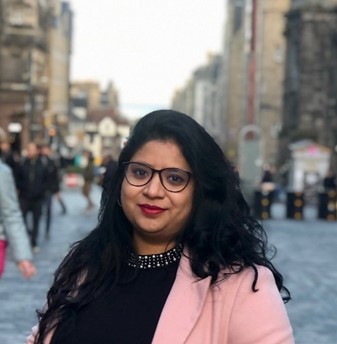
Role: Manager of the Liverpool Digital Flow Centre (LDFC) and Research Coordinator
Can you introduce yourself and a bit about your background?
I am Dr. Firdaus Parveen, currently working as the Manager of the Liverpool Digital Flow Centre (LDFC) and Research Coordinator. Prior to this role, I was a PDRA in Prof. Anna Slater’s group, where I focused on continuous flow synthesis of porphyrins, including their inline UV analysis. From 2019 to 2021, I worked as a PDRA at Imperial College London, developing continuous flow systems for the selective synthesis of primary amines. Before moving to the United Kingdom, I participated in an exchange program at the University of Saskatchewan. I completed my master’s and PhD in Chemistry and Chemical Engineering at the Indian Institute of Technology Delhi, India.
Why did you choose the University of Liverpool as your place of work?
I chose the University of Liverpool because of its prestigious ranking among top universities and its membership in the esteemed Russell Group, which offers cutting-edge research facilities. I value the University’s strong research culture, its commitment to innovation, and its vibrant academic community. The resources, collaborative environment, and opportunity to work with renowned scientists make it the ideal place for me to contribute and grow professionally.
What inspired you to choose chemistry as your field of work?
As both a chemist and chemical engineer, I thrive in the interdisciplinary nature of these two fields. From a young age, I was captivated by colour chemistry—how two reagents interact to produce vibrant compounds. Chemistry fascinated me with its ability to explain the formation of compounds and materials at the molecular level. Later, I transitioned into engineering, where I explored and optimized processes for real-world industrial applications. The interdisciplinary connection between chemistry and chemical engineering offers a perfect balance between theoretical exploration and practical application, equipping me with the tools to innovate and make a meaningful impact.
What are your specific research areas?
Flow Chemistry, Upgradation of biomass derived molecules, Homogenous and heterogenous catalysis, Ionic Liquids
Are there any challenges have you encountered during your research, and how did you overcome them?
Challenges are an inherent part of research, especially in complex fields like chemistry and chemical engineering, and finding the right solution often takes time. Consistency and hard work are essential. With research experience across three different countries, I’ve learned that challenges can vary depending on the setting—sometimes it's limited resources, while other times it's the complexity of the process itself, requiring greater effort and perseverance.
What has been your biggest achievement during your career in chemistry and how did it make you feel?
My greatest achievement to date has been the development of molecules and materials with high selectivity, minimizing byproducts and improving the E-factor—an advancement crucial for the sustainable development of processes, made possible through the application of flow chemistry. This accomplishment enabled me to establish a flow center in the MIF, which assists researchers in making their processes more sustainable, both academically and industrially.
This journey required years of research, countless experiments, and a great deal of perseverance. I encountered numerous setbacks, including unexpected results and technical challenges, but I remained determined to find solutions. When the process finally functioned as envisioned, it was an incredibly rewarding moment, confirming that all my hard work had paid off.
The recognition from my peers and the satisfaction of contributing something meaningful to the field were immensely gratifying. This achievement reaffirmed my passion for flow chemistry and chemical engineering, and I am eager to further explore automating these processes to provide faster solutions to global challenges.
How important is working in a diverse and inclusive environment for you and why?
Working as part of a diverse and inclusive team is essential because individuals from different backgrounds, experiences, and viewpoints can offer innovative solutions by approaching problems from various angles. An inclusive environment allows me to learn from colleagues with diverse cultural and educational backgrounds, which broadens my understanding and fosters my personal and professional growth. I believe that appreciating different perspectives enhances my effectiveness as a researcher and collaborator.
How would you describe the current culture of inclusion within the Chemistry department at UoL?
The Chemistry Department at the University of Liverpool has made significant progress in fostering a diverse community. This includes proactive recruitment of students and staff from a variety of backgrounds, cultures, and experiences. The department values the richness that diversity brings to academic and research environments and strives to ensure that all voices are represented and heard. It offers networking, training, and development opportunities specifically designed to support students and early-career researchers from diverse backgrounds. These programs provide guidance and foster a sense of community, helping individuals navigate their academic and professional journeys with confidence.
Is there any advice you would offer to someone who is wanting to pursue a career in chemistry?
Chemistry plays a crucial role in tackling global challenges such as climate change, healthcare, and energy. As a constantly evolving field, it is essential to remain curious and committed to lifelong learning. Perseverance, resilience, and patience are vital for overcoming challenges, setbacks, and failures. Believing in yourself and maintaining consistent effort will benefit you in all aspects of life.
Back to: Department of Chemistry